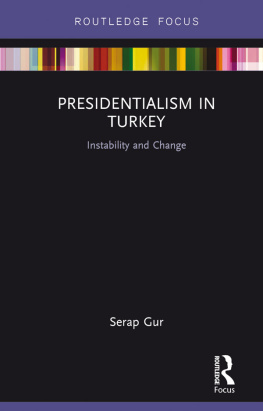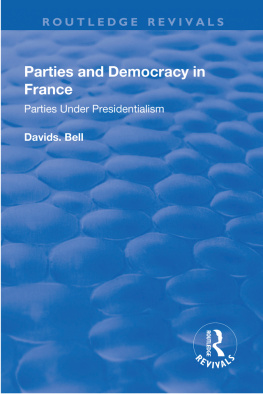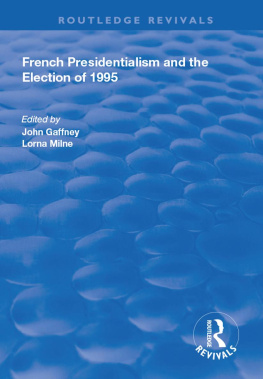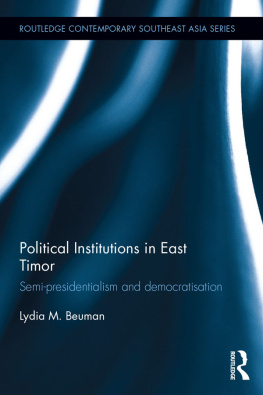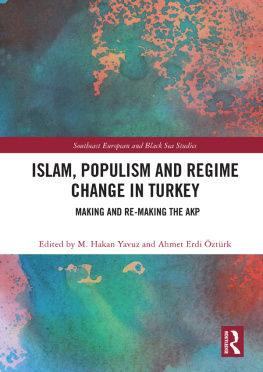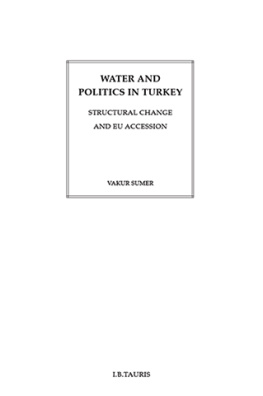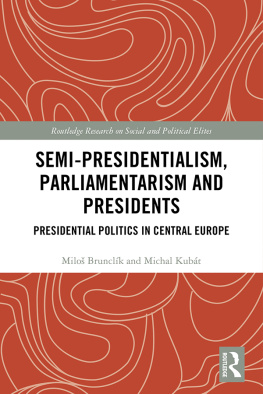Presidentialism in Turkey
Parliamentarism has been a presiding characteristic of the Turkish political tradition since the 1876 Ottoman constitution. In 1923, with the founding of the Turkish Republic, modern parliamentarism was implemented in Turkey. Since that time, Turkish politics has been turbulent, with four military coups, a number of short-lived multiparty coalitions, and several ineffective governments. Many scholars have argued that the main reason for this instability is the parliamentary system of government, so Turkey must therefore adopt a presidential system.
Presidentialism in Turkey uses both quantitative analysis and country-based comparisons to explore whether such a change might solve Turkeys main political problems or if it might in fact create more problems for the nation. The relationship between government systems and political, economic, and social development is explored in a time-series analysis covering the period 19752014 for Turkey. It is argued that during this time period, the parliamentary system was better than the presidential system at boosting economic and political development, whereas the presidential system provides better social development. Furthermore, a country-based analysis in which Turkey is compared with other states that have used a presidential system at some point since 1975 highlights that each country has its own specific characteristics that affect its economic and political success. Thus, a regime transformation to a presidential system will not necessarily improve Turkeys economic, political, and social development.
By including a comparison of all presidential, parliamentary, and semi-presidential systems, this book helps to shed new light on what is a very controversial topic in Turkey. It will therefore be a key resource for students and scholars of Turkish studies and comparative politics.
Serap Gur is currently an Adjunct Professor in the Department of Political Science at Northern Illinois University. Her research interests include comparative politics (political institutions), international relations (Middle East, womendemocracy) and Turkish politics.
Routledge Focus on the Middle East
Presidentialism in Turkey
Instability and Change
Serap Gur
Presidentialism in Turkey
Instability and Change
Serap Gur
First published 2017
by Routledge
2 Park Square, Milton Park, Abingdon, Oxon OX14 4RN
and by Routledge
711 Third Avenue, New York, NY 10017
Routledge is an imprint of the Taylor & Francis Group, an informa business
2017 Serap Gur
The right of Serap Gur to be identified as author of this work has been asserted by her in accordance with sections 77 and 78 of the Copyright, Designs and Patents Act 1988.
All rights reserved. No part of this book may be reprinted or reproduced or utilised in any form or by any electronic, mechanical, or other means, now known or hereafter invented, including photocopying and recording, or in any information storage or retrieval system, without permission in writing from the publishers.
Trademark notice: Product or corporate names may be trademarks or registered trademarks, and are used only for identification and explanation without intent to infringe.
British Library Cataloguing in Publication Data
A catalogue record for this book is available from the British Library
Library of Congress Cataloging in Publication Data
Names: Gur, Serap, author
Title: Presidentialism in Turkey : instability and change / Serap Gur.
Description: Milton Park, Abingdon, Oxon : Routledge, 2017. | Series: Routledge focus on the Middle East | Includes bibliographical references and index.
Identifiers: LCCN 2016040332 | ISBN 9781138236066 (hardback) | ISBN 9781315303192 (ebook)
Subjects: LCSH: Representative government and representationTurkey. | TurkeyPolitics and government19601980. | TurkeyPolitics and government1980 | TurkeyEconomic conditions1960 | TurkeySocial conditions1960
Classification: LCC JQ1805 .G87 2017 | DDC 320.9561dc23
LC record available at https://lccn.loc.gov/2016040332
ISBN: 978-1-138-23606-6 (hbk)
ISBN: 978-1-315-30319-2 (ebk)
Typeset in Times New Roman
by Apex CoVantage, LLC
To my daughter, Mehtap Sare Gur, and my husband, Furkan Amil Gur
Contents
This project began as my dissertation at Louisiana State University (LSU), and I could not have completed this long journey without the guidance of my committee members there: Joe Clare, Wonik Kim, and especially my advisor and mentor, William Clark. Dr. Clark took every possible step to support me during my doctoral studies and was a perfect role model. I am thankful for his guidance, generosity, and patience and will look up to him for the rest of my life.
I would like also to thank Joe Clare for his advice on methodological issues. His recommendations contributed to the rigor of my study and made my life easier. Bob Mann from the Manship School of Communication at LSU read the manuscript chapter by chapter and offered important comments, for which I thank him.
Finally, I want to thank my husband, Furkan Amil Gur, for his support and understanding throughout this process, and my daughter, Mehtap Sare Gur, who brought joy and happiness to our lives and made every hurdle much more bearable.
Parliamentarism has been a presiding characteristic of the Turkish political tradition since the 1876 Ottoman constitution. In 1923, with the founding of the Turkish Republic, modern parliamentarism was implemented in Turkey. Since that time, Turkish politics have been turbulent: Turkey has witnessed four military coups (1960, 1971, 1980, and 1997), a number of short-lived multiparty coalitions, and several ineffective governments. Some argue that the main problem associated with this instability is the parliamentary system of government, and a number of scholars and intellectuals have argued that Turkey must adopt a presidential system as a solution (Kuzu, 2006; Fendoglu, 2010; Gonenc, 2011).
As a result, there are ongoing discussions among academics and senior leaders of the Justice and Development Party (AKP) regarding the transition from a parliamentary system of government to a presidential system. This debate first arose during Turgut Ozals period in office in the late 1980s, but ended due to his unexpected death in 1993. President Suleyman Demirel brought up the issue again in 1997, but did not enact the transformation. Former prime minister and current president Recep Tayyip Erdogan raised the issue in 2003, and the debate has grown more heated since 2010 (Gonenc, 2005). All of these prominent Turkish political figures have argued that a presidential system is more suitable for the Turkish society and political system because Turkey needs an executive authority that can execute decisions more efficiently and quickly (Kalaycioglu, 2005; Uran, 2010).
The Erdogan government is serious about its plan to shift to a presidential system from the current parliamentary system and has begun making arrangements for this transformation, including implementing changes regarding the election of the president. Before 2007, the Turkish president was elected in a secret ballot by the parliament for a seven-year term. A two-thirds majority was required for election. Since 2007, when a national referendum altered the structure, the president has been elected in a popular plurality election. The presidential term was reduced from seven years to five, and the reelection of the president for a second term was allowed (Ay, 2004; Arslan, 2005).


